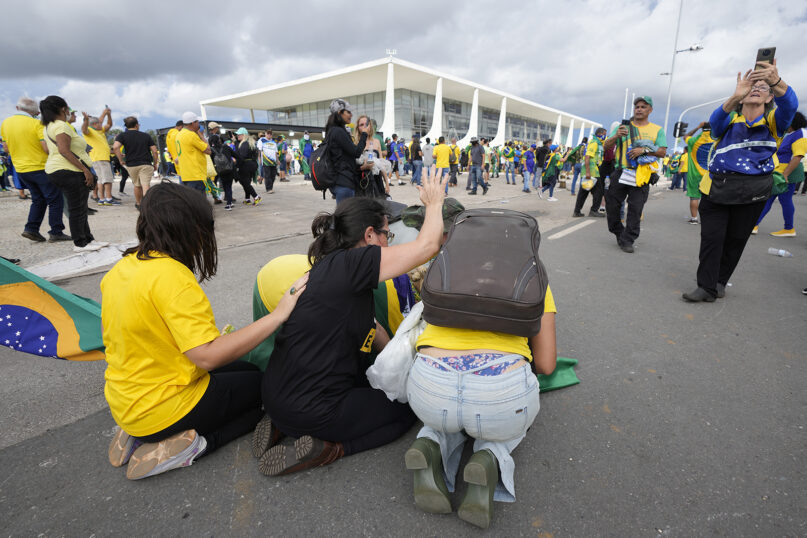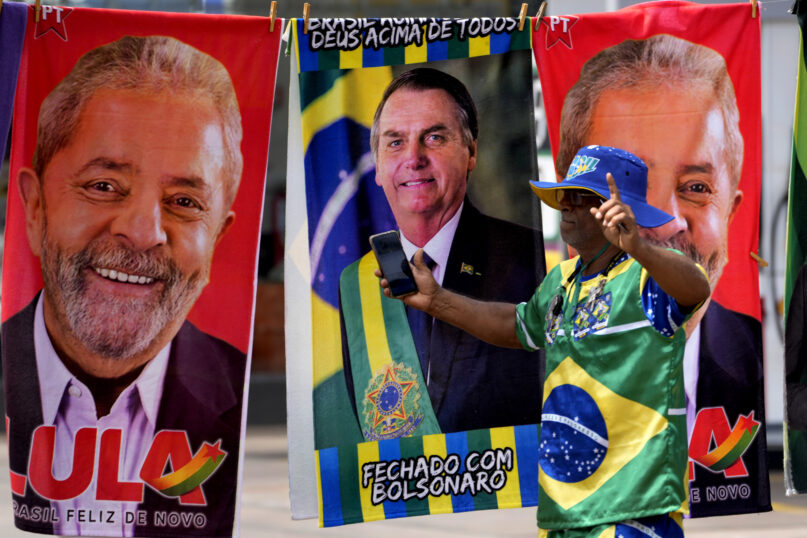
SÃO PAULO (RNS) — A report released Nov. 26 by Brazil’s federal police details a conspiracy allegedly involving former President Jair Bolsonaro and 36 others to stage a coup to prevent President Luiz Inácio Lula da Silva from taking office in 2023.
The list of 37 indicted individuals, which includes a Roman Catholic priest, was received with outrage by evangelical Christian supporters of the right-wing former president, who have called the police investigation an effort by Lula and members of Brazil’s Supreme Court to persecute conservatives in South America’s most populous nation.
According to the report, after Lula won the presidential election in October 2022, Bolsonaro and close members of his entourage, most of them high-ranking military officers, launched a secret operation with the goal of keeping him as president indefinitely.
Their smartphone messages, disclosed in the 884-page police report, suggest the plan was supported by broad segments of the armed forces, including generals and colonels who were allegedly waiting for Bolsonaro’s green light to take control of the government.
A parallel inquiry, which resulted in the detention of five people the previous week, asserted that the conspirators planned to kill Lula, Vice President Geraldo Alckmin and Supreme Court Justice Alexandre de Moraes using explosives or poison. De Moraes headed the investigation into the attempted coup.
The report said the conspirators divided into groups, each assigned different tasks. One group was in charge of spreading fake news about the electoral system, a campaign Bolsonaro had been carrying out since the previous year, claiming that voting machines had allowed Lula to skew the presidential vote.

Supporters of Brazil’s former President Jair Bolsonaro kneel to pray as they storm the Planalto Palace in Brasilia, Brazil, Jan. 8, 2023. Planalto is the official workplace of the president of Brazil. (AP Photo/Eraldo Peres)
The Rev. José Eduardo de Oliveira e Silva, a Catholic priest who is a spiritual adviser to the Brazilian Union of Catholic Jurists, was allegedly assigned to the so-called judicial group, which police say was asked to establish a legal basis for the military intervention, mostly making use of Article 142 of the Brazilian Constitution. The article gives the armed forces responsibility for guaranteeing law and order, often interpreted by the far right as a permission to intervene in a constitutional crisis. In April, the country’s high court ruled that the military’s duties did not include staging a coup.
A vicar in the city of Osasco, outside São Paulo, Silva has connections to the Opus Dei and earned a Ph.D. in moral theology at the organization’s University of the Holy Cross in Rome. He was a close friend of Olavo de Carvalho, an ideologue of Brazil’s far right until his death in 2022.
The report documented several trips Silva took to Brasilia in November and December 2022, where he had contact with some of the alleged conspirators, including Filipe Martins, special adviser to Bolsonaro and a friend of Olavo de Carvalho.

The Rev. José Eduardo de Oliveira e Silva in an Instagram post. (Video screen grab)
Miguel Vidigal, Silva’s attorney and the president of the Catholic jurist group, said in a statement that Silva visited Brasilia and talked to the others named in the indictments as part of his work as a priest, which has included campaigns against abortion.
Vidigal accused the federal police of a fishing expedition and accused the police of violating the confidentiality afforded priests and those he counsels.
With more than 430,000 followers on Instagram, Silva is known for his public opposition to gender theory and abortion. In the run-up to the 2022 election, he hung a Brazilian flag from his pulpit. His social media posts show that he’s close to influential members of the Bolsonarist faction.
In a message to a fellow priest included in the report, Silva said Catholics and evangelicals should pray to give the defense minister and 16 other generals “courage to save Brazil.”
Silva had already surrendered his cellphone to the authorities earlier this year in connection with an earlier investigation and was barred from leaving the country.
It’s not clear yet if Bolsonaro, Silva and the other indicted conspirators will be detained. Since the report was released, evangelical Christian leaders allied with the former president have expressed anger and pledged to take to streets if he’s arrested.
“We will react if they maliciously imprison him. There will be a national reaction,” evangelical leader and Congressman Sóstenes Cavalcante told RNS, adding that in Brazil “there’s no legal safety anymore, all that is left is Alexandre de Moraes persecuting conservatives and right-wingers.”
Pastor Aloizio Penido, a prominent Baptist, told RNS that the left “wants to prevent Bolsonaro from getting back to presidency, the same way they did with [U.S. President Donald] Trump.”
“But in the U.S. they failed, because people still breathe the air of democracy there,” he said.
Penido also thinks that it’s only a matter of political persecution of conservatives. “A convicted criminal was ‘de-convicted’ and is now in the presidency,” he said, referring to Lula. “With Bolsonaro they want to do the opposite; they want to condemn an innocent.”
After serving as president from 2003 to 2011, Lula was convicted for bribery crimes in 2017 and imprisoned for 580 days. Sergio Moro, the judge who oversaw his case, later became Bolsonaro’s Justice minister. After suspicions of political intrigue were raised, Lula’s sentences were vacated in 2021, allowing him to run for president in 2022.
Conservative Catholics have registered criticisms of the current investigation on social media, especially lay members of the Charismatic Catholic Renewal and members of ultratraditionalist groups.

A man passes a street vendor’s towels for sale featuring Brazilian presidential candidates Jair Bolsonaro, center, and Luiz Inacio Lula da Silva, in Brasilia, Brazil, Sept. 27, 2022. (AP Photo/Eraldo Peres)
According to Vinicius Borges Gomes, a communications professor at the Pontifical Catholic University of Minas Gerais who has studied the Catholic right wing in Brazil, the alleged involvement of a clergyman in the conspiracy is surprising. “The participation of clerics in the diffusion of radical rhetoric has always been evident, but it was not clear yet if priests were actually involved in plans for a coup,” he said.
But Borges Gomes said the relationship between priests and far-right politicians is in line with a growing closeness between the new right and Catholic leaders around the world. “Many Catholic leaders talk about a ‘spiritual war’ and tell their followers to combat those who they don’t agree with.”
Others said there may be limits to how far Bolsonaro’s evangelical bloc in Congress is willing to go. An aide to the bloc who asked to remain anonymous told RNS, “Many members have a pragmatic relationship with the Lula administration and seek to take advantage of it.”
